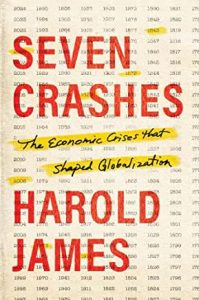Economic crises are clearly all different – they can be triggered by many types of shock, and occur in many different contexts. Yet we hope to bring to bear on each new crisis lessons learned in dealing with earlier ones. Thus Ben Bernanke’s deep study of the Great Depression was generally seen as a plus in his presence as Fed Chair in the 2008 Great Financial Crisis. Similarly, Reinhardt and Rogoff argued, with the ironic choice of title for their book This Time Is Different, that there are in fact commonalities in all debt crises due to the arithmetic of debt dynamics.
A very enjoyable new book by Harold James, Seven Crashes: The Economic Crises That Shaped Globalization, applies the lens of whether each the seven advanced or set back the process of globalization to crises ranging from famines and blights in the 1840s via wars and depressions, commodity price hikes in the 1970s, the GFC and the Covid lockdowns and Russian invasion of Ukraine.
Very broadly speaking, he suggests that supply shocks tended to advance globalization as economic activity reorganised itself around the shocks to find new sources of supply. These shocks always reveal narrow bottlenecks. Never mind Ukrainian sunflower oil and grain; who knew that the country also produced 90% of the neon gas needed to manufacture semi-conductor chips? Demand shocks tended to do the opposite, and lead to a retreat from global markets, tending to be deflationary. This is not a hard and fast rule, not least because demand and supply soon interact.
However, that’s as far as the generalization goes. The author – a very eminent economic historian – sets out a key argument early on: “The turning points of globalization in a world that is industrialized and interconnected do not resemble each other. Each moment of crisis challenges individuals, businesses and governments in new and unprecedented ways, and leads to a redrawing of the mental map.” Each time is different. He argues, furthermore, that it is a mistake to try to learn lessons from the past – new problems need new solutions, rather than policymakers who are focused on fighting the previous (metaphorical) war.
The bulk of the book consists of chapters giving an account of the context and specifics of each of the selected crises. These are masterly concise essays, covering the economic events but also weaving in the influential economic ideas in each case, often through a chosen examplar such as Keynes. The book also resists the temptation of offering a final ten bullet point recommendations for tackling the next crisis. Because it will be different.

